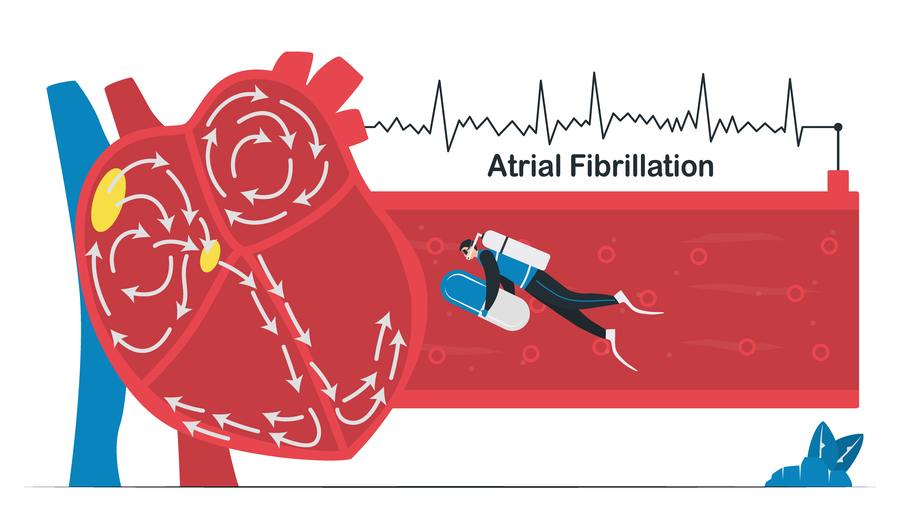There’s nothing quite as unsettling as feeling like your heart is racing out of control, especially when it happens out of the blue. An irregular rhythm can feel alarming, and understandably so. These symptoms could be signs of atrial fibrillation, which is a common heart condition that millions of people experience. How dangerous is AFib, and what does it mean for your long-term health? At Capitol Cardiology Associates, we’re here to help. Keep reading to learn what AFib is, why it happens, and what can be done about it.
What’s Really Going On During Atrial Fibrillation?
When we talk about AFib, we’re referring to an abnormal rhythm in the heart’s upper chambers, known as the atria. In a healthy heart, these chambers contract in sync to move blood through the heart and out to the rest of the body. But during AFib, the electrical signals that control this process go haywire, causing the atria to quiver or beat out of sync with the lower chambers. Instead of a steady heartbeat, what you get is a rapid, chaotic rhythm that can feel like your heart is racing, pounding, or fluttering uncontrollably. AFib doesn’t always announce itself loudly. Some people may have it and not feel a single symptom, while others might experience heart palpitations, shortness of breath, fatigue, or chest pain.
Why Does AFib Happen in the First Place?
Atrial fibrillation can be brought on by a variety of factors, and sometimes, it just seems to develop without a clear reason. However, some common culprits include high blood pressure, heart disease, or previous heart surgeries. Sleep apnea, heavy alcohol use, and stress can play a role, too. Sometimes, it’s just part of the aging process. AFib becomes more common as we get older. In some cases, there are underlying health issues at play, such as hyperthyroidism or a history of heart attacks, that can lead to AFib. Even certain infections or lung diseases can throw your heart’s rhythm off balance. A heart doctor or cardiologist can run the necessary tests to figure out what’s causing AFib in your case.
Should You Be Worried?
In short, yes, but the level of danger depends on how well it’s managed. AFib on its own isn’t necessarily life-threatening, but it can lead to complications that are much more serious if left untreated. One of the biggest risks with AFib is the increased chance of blood clots. Because the atria aren’t beating effectively, blood can pool in the heart, which raises the risk of clots forming. If a clot travels to the brain, it can cause a stroke, which is one of the major concerns with AFib. In fact, people with AFib are five times more likely to have a stroke than those without it. That’s why many people with AFib are put on blood thinners to reduce the risk. There’s also the issue of heart failure. Over time, AFib can weaken the heart if it’s constantly under the stress of irregular beats. This can lead to heart failure, where the heart isn’t able to pump blood as efficiently as it should. So, while AFib itself might not be immediately dangerous, its long-term effects can certainly be concerning.
How Can You Manage AFib and Keep Your Heart Safe?
So, what happens next if you’re diagnosed with AFib? Thankfully, there are several ways to manage and treat the condition, and the right approach depends on your specific situation. Treatment generally focuses on controlling the heart’s rhythm, preventing blood clots, and addressing any underlying causes. Medications are often the first line of defense. Beta-blockers, calcium channel blockers, or anti-arrhythmic drugs can help regulate your heart’s rhythm and prevent it from going too fast. Blood thinners like warfarin or newer medications such as apixaban are commonly prescribed to reduce the risk of stroke. For some people, medications aren’t enough to keep AFib in check, and other procedures may be necessary. Cardioversion uses electrical shocks to reset the heart’s rhythm, and ablation uses heat or cold to destroy the heart tissue that's causing abnormal signals. In more severe cases, a pacemaker might be needed to help the heart maintain a normal rhythm. Making lifestyle changes is also an important part of managing AFib. Reducing alcohol consumption, managing stress, getting regular exercise, and maintaining a healthy weight can all help minimize the frequency and severity of AFib episodes. Your heart doctor can guide you through what specific changes might make the biggest difference in your case.
How to Stay on Top of AFib and Protect Your Health
If your heart feels out of sync, you’re suddenly more tired than usual, or you’re experiencing chest pain, reach out to your heart doctor. These could be signs that your AFib is acting up or that your treatment plan needs adjusting. Never underestimate the power of a healthy lifestyle in managing AFib, either. Eating heart-healthy foods, staying active, and limiting caffeine and alcohol can go a long way in keeping your heart strong. And while stress is often unavoidable, finding healthy ways to manage it can help keep your heart in rhythm.
Are You Concerned About Atrial Fibrillation?
Atrial fibrillation doesn’t have to control your life, but it does require attention and care. The sooner you take steps to manage it, the better off your heart will be in the long run. At Capitol Cardiology Associates, we’re here to support you every step of the way, from diagnosis to treatment and ongoing care. If you’ve been experiencing irregular heartbeats or other symptoms, don’t wait. Reach out to us today to schedule a consultation with one of our experienced cardiologists.






